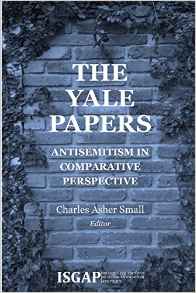Between 2006 and 2011, the Institute for the Study of Global Antisemitism and Policy (ISGAP) established and sponsored the Yale Initiative for the Interdisciplinary Study of Antisemitism (YIISA), the first academic research center dedicated to the study of antisemitism based at a North American university. During its mandate, YIISA hosted a successful graduate and post-graduate fellowship program, research projects, and a high-level interdisciplinary seminar series at Yale University. The present volume – The Yale Papers: Antisemitism in Comparative Perspective – includes a selection of the papers presented in the framework of this seminar series, as well as several other working papers, conference papers, and lectures commissioned by or submitted to YIISA by eminent scholars and researchers from around the world. In addition to providing a fascinating overview and scholarly analysis of some of the many facets of historical and contemporary antisemitism around the globe, this volume stands as a solid and incontrovertible testament to the abundant – and, above all, productive – academic activity that characterized YIISA’s truncated tenure at Yale University.
Table of Contents
- Introduction, Charles Asher Small;
- Anti-Israel Sentiment Predicts Antisemitism in Europe, Edward H. Kaplan and Charles A. Small;
- The Road to an Internationally Accepted Definition of Antisemitism, Dina Porat;
- Hitler’s Legacy: Islamic Antisemitism in the Middle East, Matthias Küntzel;
- Continuities, Discontinuities, and Contingencies: Anti-Alienism, Antisemitism, and Anti-Zionism in Twentieth-Century South Africa, Milton Shain;
- Anti-Zionism and Antisemitism: Cosmopolitan Reflections, David Hirsh;
- This Green and Pleasant Land: Britain and the Jews, Shalom Lappin;
- Never Again? When Holocaust Memory Becomes Empty Rhetoric, a Diplomatic Tool, and a Weapon against Israel, Walter Reich;
- Leo Strauss as a Jewish Thinker, Steven Smith;
- The Academic and Public Debate over the Meaning of the “New Antisemitism,” Roni Stauber;
- Western Culture, the Holocaust, and the Persistence of Antisemitism, Catherine Chatterley;
- Demonizing Israel: Political and Religious Consequences among Israelis, Yossi Klein Halevi;
- Uncivil Society: Ideology, the Durban Strategy, and Antisemitism, Gerald Steinberg;
- Victims of Success: How Envious Antisemitism Foments Genocidal Intent and Undermines Moral Outrage, Peter Glick;
- Why Well-Intentioned Westerners Fail to Grasp the Dangers Associated with Islamic Antisemitism:
- Some Arguments Considered, Neil Kressel;
- Trauma in Disguise: The Effects of Antisemitism, Hadar Lubin;
- Mixed Emotional Needs of Israeli-Jews as a Potential Source of Ambivalence in their Response to the Iranian Challenge, Nurit Shnabel and John F. Dovidio;
- Global Antisemitism: Assault on Human Rights, Irwin Cotler;
- The Principles and Practice of Iran’s Post-Revolutionary Foreign Policy, Brandon Friedman;
- Missing from the Map: Feminist Theory and the Omission of Jewish Women, Jennifer Roskies;
- 1948 as Jihad, Benny Morris;
- Jews in China: Legends, History, and New Perspectives, Pan Guang;
- Our World of Contradictions: Antisemitism, Anti-Tutsi-ism, and Never Again, Berthe Kayitesi;
- Two Steps Forward, One Step Back: Diplomatic Progress in Combating Antisemitism, Michael Whine;
- Memetics and the Viral Spread of Antisemitism through “Coded Images” in Political Cartoons, Yaakov Kirschen;
- From Sayyid Qutb to Hamas: The Middle East Conflict and the Islamization of Antisemitism, Bassam Tibi;
- Israel, Jordan, and Palestine: One State, Two States, or Three?, Asher Susser;
- A “Paradise of Parasites”: Hannah Arendt, Antisemitism, and the Legacies of Empire, Dorian Bell;
- “I Don’t Know Why They Hate Us – I Don’t Think We Did Anything Bad to Hurt Them,” Nora Gold.



